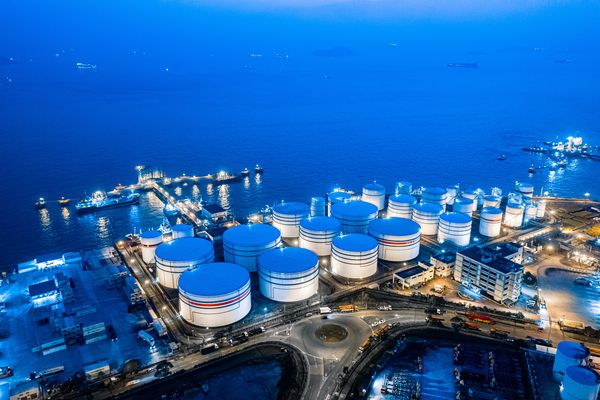What happened
Shares of refiner Phillips 66 (PSX +4.68%) jumped nearly 7% in early trading on July 21. That gain was easily outdone by energy services giant Halliburton (HAL +2.13%), which rose 12%. But tiny U.S. oil driller Centennial Resource Development (CDEV +3.28%) was the bigger winner at the start of trading, with a gain of as much as 12% at one point in the morning. By noon EDT, Phillips 66's shares were up roughly 6.5%, but the gains at Halliburton and Centennial had both tapered to around 9% or so.
So what
There's a lot to unpack here, but the big picture is that oil prices were on the rise today. That's particularly good news for Centennial Resource Development, which is trying to muddle through the current oil downturn with an onerous level of debt. The roughly $250 million market cap exploration and production company has around $1.1 billion in long-term debt and a financial debt-to-equity ratio of over 13 times. There are very real concerns surrounding the company's ability to survive the downturn, and any uptick in oil prices can only make things better. That said, oil remains stuck at a level that makes it hard for energy companies to turn a profit. So today's good oil news should be viewed cautiously here.

Image source: Getty Images.
In fact, Halliburton, which reported earnings on July 20, shows just how bad things have been in the energy sector. The energy services company reported a loss of $1.91 per share in the second quarter, even worse than the $1.16 per share it lost in the first quarter. One-time charges were the main driver of the red ink, but clearly business is tough. However, during Halliburton's second-quarter 2020 earnings conference call, CEO Jeff Miller noted, in the onshore U.S. space, "Drilling activity declines have slowed, and we believe the rig count should find a bottom sometime in the third quarter." Further, he believes, "International producers have the opportunity to regain market share as a result of declining U.S. production. This should translate into healthy activity levels internationally as oil demand recovers." That's actually a pretty upbeat view of things when you add in that oil prices were moving higher on the day. Energy services companies like Halliburton normally see demand fall off when energy prices are low and demand return when prices start to rise. Worth noting, the company managed to earn $0.05 per share when you pull out one-time items, so all of that red ink seems to be masking a company that's doing relatively well given the circumstances.
Refiner Phillips 66's stock, meanwhile, is likely benefiting from a trend that's a little different but tied in here just the same. One of the reasons for the upbeat view of oil is that there has been some positive news on the economic front as countries deal with the fallout from COVID-19. Specifically, the European Union just agreed to an aid package and in the U.S. discussions on a deal are starting to get more serious. Increased economic activity could lead to increasing demand for both oil and the refined products that Phillips 66 makes using oil. So while higher oil prices could mean increasing input costs for refiners, higher demand would likely offset that hit and then some.
Now what
There are a lot of moving parts in the energy sector. Today's oil price advance is helping drillers, like Centennial, and bodes well for the companies that provide them services, like Halliburton. Meanwhile, the economic news that's helping support oil prices has other implications within different energy industry niches, noting that an improving economy is likely to mean more demand for the refined products that downstream players like Phillips 66 create. Still, investors in the energy space shouldn't get too excited. Moods shift quickly on Wall Street today, and the sector could just as easily fall tomorrow as it has risen today. In fact, the one thing that you can expect with some certainty is that volatility is likely to remain elevated.








